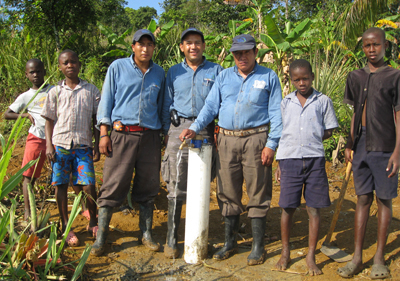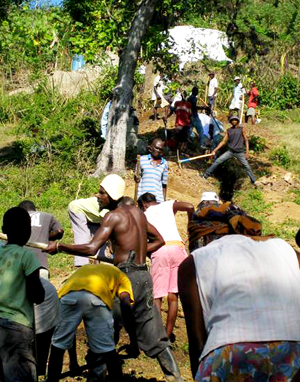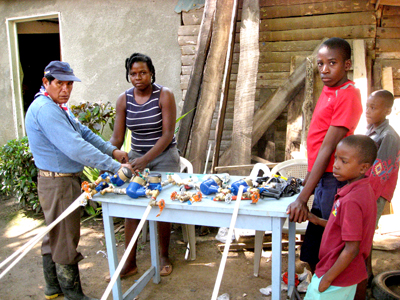MENU
 |
| The Caizas and César Cortez (holding faucet) at the opening of the first home water connection in La Bruyère. |
Little Edison's father, Francisco Caiza, asked HCJB Global missionary engineer Rydbeck for training in water systems. Soon enough he was being mentored by fellow Ecuadorian César Cortez, another missionary engineer with HCJB Global. Since 1999 Francisco has been working as part of Cortez's team on water projects along the coast of Ecuador.
"I remember when Eddie (Edison) was a little boy following his father," recalled Cortez. A decade since that first encounter, father and son joined Cortez to work on a water project with a northern Haiti community, La Bruyère.
The project began when the people of La Bruyère asked Cortez for help while he was checking the water quality of 100 wells at the request of Lifewater Canada in 2010.
 |
| Residents of La Bruyère work together to dig a trench for a water pipe that will connect two reservoirs in the community's clean water system. |
For Cortez, a turning point occurred during a later tour of the work by officials, missionaries and aid workers. Cortez watched as their skepticism turned to amazement when they witnessed impoverished Haitians-seemingly dependent on handouts of foreign aid-working without pay to renovate a dysfunctional water system, providing high-quality spring water for their community.
Once the project was under way, the community even helped raise funds to cover reservoir land costs by charging 2 cents for every water jug filled at their public taps.
Last February the three Ecuadorians worked with Haitians to make repairs to the first reservoir, build a second tank and install 50 home connections. They also trained a Haitian team to build an additional 250 connections which Cortez returned to check in July.
This marked the Caizas' second trip to La Bruyère. Prior to their leaving Ecuador, the evangelical church in Columbe Chico sent them off with a special dedication service. Upon their return a month later, crowds of family and friends received them at the new Quito airport.
 |
| Francisco Caiza shows local Haitians how to assemble water meters. |
"The community president is now so excited and won't leave us alone until we complete the project," said Cortez.
The final phase of work is planned for February 2014 when Ecuadorians and Haitians will work together to build 300 bucket-flush toilets.
Twenty-five years ago, when Rydbeck began applying his engineering skills to implement clean-water projects in needy communities, he realized that the indigenous Quichua people had much to teach him. He incorporated their ingenuity into his own unique designs for rural water systems. Divine guidance, wisdom and provision were also essential.
For Rydbeck, the situation has come full circle. Francisco and Edison demonstrate his vision of preparing people to obey Jesus' command to provide for thirsty people and to reach the nations.
Today the indigenous Quichuas are sending out their own skilled technicians. Trained by HCJB Global's community development team, these technicians are influencing other communities to improve their health through clean water.
For the Caizas, this is about giving glory to God. "I'm amazed at how Edison and Francisco pray and give testimony of God's help to the people," Cortez says.
Source: HCJB Global
